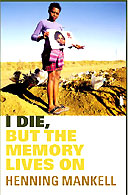
I Die, But the Memory Lives On: The World's Aids Crisis and the Memory Book Project
by Henning Mankell trans Laurie Thompson
120pp, Harvill, £5.99
It is often a bad sign when a book begins with a dream. When the dream is of a Swedish forest, with African faces staring out of the tree trunks, you know you are in real trouble. Worse still, "the black people whose faces can be made out among the tree trunks have died of Aids. The skin is tightly stretched over the bones of their faces. The dead people are thin, fading away, in great pain. Nowhere is there a trace of calm or resignation."
Perhaps it reads better in the original Swedish. The author of these over-excited images - the crime writer Henning Mankell, a person of some reputation - then punches in one of those single-sentence paragraphs that are calculated to create maximum effect but seldom achieve it:
"Their screams are silent."
This is a worthy project, badly executed. Mankell himself has done much work for the Memory Books scheme, which promotes the creation of written and illustrated autobiographical accounts by African parents with Aids, so that their children will have something by which to remember them when orphaned. The aim of the scheme is to encourage the children to take hope and to do the best they can for their future.
Even on a continent where many cannot read, it is a good idea (some memory books contain photographs, or locks of hair). However, in the opinion of this reviewer Mankell's prose doesn't do the project any favours. He clearly isn't posturing, but many of the paragraphs read to me like postures, or even parodies of postures: "This dream upsets me. It seems to me that the images of conifers and all the dead people have been visiting the inside of my head by mistake. As if they had no business to be there."
Quite simply, this is not a good enough book, in no way meeting the gravity of the situation it addresses. Part of this is to do with the slightness of Mankell's contribution in terms of length. It does not help to fill out the book with essays by Anders Wijkman, a member of the Euro pean parliament and former assistant secretary general of the UN who sits on the board of Plan, which runs the Memory Book project, and by Dr Rachel Baggaley, head of Christian Aid's HIV Unit. These essays are well written, models of what they are intended to do - give hard information about the continuing Aids crisis in Africa - but they belong to another book. Mankell should not need them.
Simply because one agrees with the aims of a charity book (Mankell is donating his royalties to an Aids charity of his choice), it does not mean one ought to give it a positive review. The best thing to be said about this book is that it brings its subject into focus. Aids is now the predominant factor of social and political existence in sub-Saharan Africa; it is the frame of being there and will remain so until a cure is found. Only then, assuming the medicine is made cheaply available, will the agony abate.
Under the circumstances, it is probably best to concentrate on the things that Mankell gets right. He is right, in the course of several interviews with and descriptions of people with HIV and their relatives, to draw attention to the terrible feeling of waiting for death that they all endure. He is right, too, to draw attention to the gross disparity of those with the illness in Europe and those with it in Africa. One would not wish to belittle anyone's endurance of HIV and Aids, but sufferers in Europe and sufferers in Africa go through completely different experiences. Europeans are cosseted, surrounded by carers, and they have access to the right drugs; life with HIV and Aids in Africa is a messy, dirty business borne in ragged hovels and smoke-filled huts where infection is constantly on the prowl.
There is another side to the individual extinctions of remembrance that Memory Books help to stave off. Across countries and the whole continent, history on the larger stage is being eroded, as deaths from Aids ravage the oral tradition by which much African history was hitherto passed down. Without knowledge of their history, it will be even harder for Africans to take charge of their political futures.

